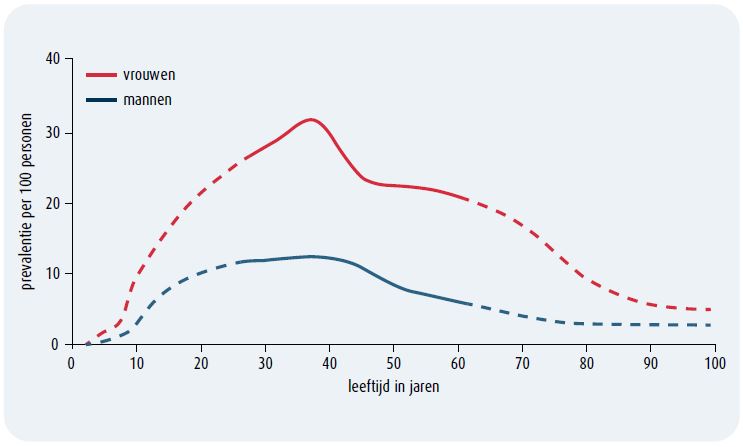-

Facts and myths about the link between headaches and food; what is true?
Does chocolate help with migraines and does coffee cause headaches? It is often said that food can prevent, cause, worsen, or reduce headaches. What are the facts and what are the myths? Neurologist Gisela Terwindt and medical researcher Britt van der Arend gave an interview in the magazine Libelle about the relationship between food and headaches, and food and migraines. You can read the article here (in Dutch).
-

Self-reported diagnosis of "menstrual migraine" has poor accuracy, headache E-diary is needed
New research from our group shows that self-reported menstrual migraine diagnosis has extremely poor accuracy. Two thirds of women suffer from menstrual migraine, independent of self-reports. Pure menstrual migraine is rare. Women with menstrual migraine have longer attack duration and increased triptan intake during perimenstrual attacks, in contrast to women without menstrual migraine. Prospective headache (E-)diaries are required for a menstrual migraine diagnosis, also in clinical practice. Read the article here.
-

Treatment of (menstrual) migraine in women
Migraine is a brain disease that occurs three times more often in women than in men. Changes are also seen throughout a woman’s life course. Hormone fluctuations play a role in this, but the exact pathophysiology is still unknown. The drop in estrogen just before menstruation may lower the threshold for having a migraine attack. Migraine attacks are therefore more often seen in the period of two days before the first day of the menstrual bleeding up to three days later. These so-called perimenstrual attacks are more severe and longer of duration. As a result, the headache returns more often after taking a triptan (recurrence), because the effect duration of a triptan is too short for the duration of the migraine attack. Therefore, there is a great need for a woman-specific (hormonal) treatment for migraines. Read the full article here (in Dutch).
-

Migraine topic in magazine "Medisch Contact"
Women in particular suffer from migraines, yet little is known about the causes and sex-specific treatment of migraine in women. Physicians and researchers of the Leiden University Medical Center and Erasmus MC are now changing that. They investigate the influence of sex hormones in women with migraine and look for the optimal therapy. Read the article here (in Dutch).
-

Article in magazine Margriet: migraine in women is more than "just a headache"
One out of three women experiences migraine, a brain disorder which occurs three times more often in women than in men. And that is exactly where it goes wrong: because health care is mainly based on the male body, treatment is insufficiently adapted to women. We believe that this subject deserves more attention in healthcare, certainly in combination with more specific attention for women in neurological disorders and in particular migraine. Read the article here (in Dutch).
-

Migraine special: genetics and hormones
Everybody can suffer from a migraine attack once in a while, but the risk is not the same for everybody. Genetics play a role, but also sex hormones can be linked to an increased risk. In this interview, prof. Gisela Terwindt, and physician researchers Irene de Boer and Iris Verhagen, share their insights and recent research developments.
Publicaties
van der Arend, BWH, van Casteren, DS, Verhagen, IE et al. Continuous combined oral contraceptive use versus vitamin E in the treatment of menstrual migraine: rationale and protocol of a randomized controlled trial (WHAT!). Trials 25, 123 (2024). PubMed.
Verhagen, IE, de Vries Lentsch, S, van der Arend, BWH, le Cessie, S, MaassenVanDenBrink, A, Terwindt, GM. Both perimenstrual and nonperimenstrual migraine days respond to anti-calcitonin gene-related peptide (receptor) antibodies. Eur J Neurol. 2023; 30: 2117- 2121. PubMed.
Verhagen IE, van der Arend BW, van Casteren DS, et al. Migraine with and without aura in relation to the menstrual cycle and other hormonal milestones: A prospective cohort study. Cephalalgia. 2023;43(6). PubMed.
Verhagen IE, van der Arend BWH, van Casteren DS, le Cessie S, MaassenVanDenBrink A, Terwindt GM. Sex differences in migraine attack characteristics: A longitudinal E-diary study. Headache. 2023; 63: 333-341. PubMed.
Verhagen IE, Spaink HA, van der Arend BW, van Casteren DS, MaassenVanDenBrink A, Terwindt GM. Validation of diagnostic ICHD-3 criteria for menstrual migraine. Cephalalgia. 2022 Oct; 42(11-12): 1184-1193. PubMed.
Verhagen, I.E., Brandt, R.B., Kruitbosch, C.M.A., MaassenVanDenBrink A, Fronczek R, Terwindt GM. Clinical symptoms of androgen deficiency in men with migraine or cluster headache: a cross-sectional cohort study. Journal of Headache and Pain 22, 125 (2021). PubMed.
van Casteren DS, Verhagen IE, BWH van der Arend, EW van Zwet, MaassenVanDenBrink A, Terwindt GM. Comparing perimenstrual and nonperimenstrual migraine attacks using an E-diary. Neurology. 2021 Sep. PubMed.
van Casteren DS, Verhagen IE, Onderwater GL, MaassenVanDenBrink A, Terwindt GM. Sex differences in prevalence of migraine trigger factors: A cross-sectional study. Cephalalgia. 2021 May; 41(6):643-648. PubMed.
van Casteren DS, Kurth T, Danser AHJ, Terwindt GM, MaassenVanDenBrink A. Sex Differences in Response to Triptans: A Systematic Review and Meta-analysis. Neurology. 2021 Jan 26; 96(4):162-170. PubMed.
van Casteren DS, Verhagen IE, de Boer I, de Vries Lentsch S, Fronczek R, van Zwet EW, MaassenVanDenBrink A, Terwindt GM. E-diary use in clinical headache practice: A prospective observational study. Cephalalgia. 2021 Oct; 41(11-12): 1161-1171. PubMed.
van Casteren DS, van Willigenburg FAC, MaassenVanDenBrink A, Terwindt GM. Jealousy in women with migraine: a cross-sectional case-control study. The Journal of Headache and Pain. May 2020. PubMed.
van Casteren DS, MaassenVanDenBrink A, Terwindt GM. Migraine and other headache disorders in pregnancy. Handbook of Clinical Neurology. 2020. PubMed.

